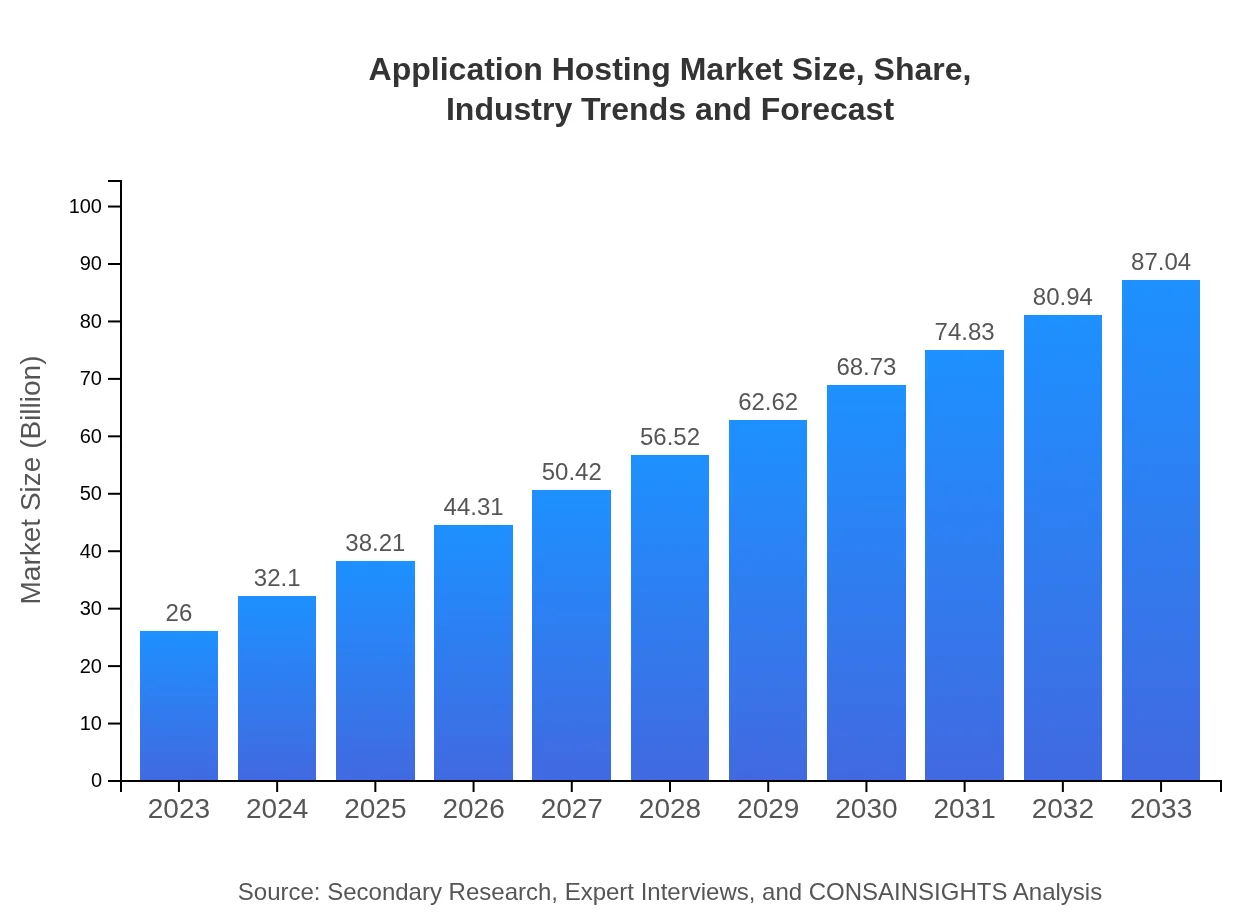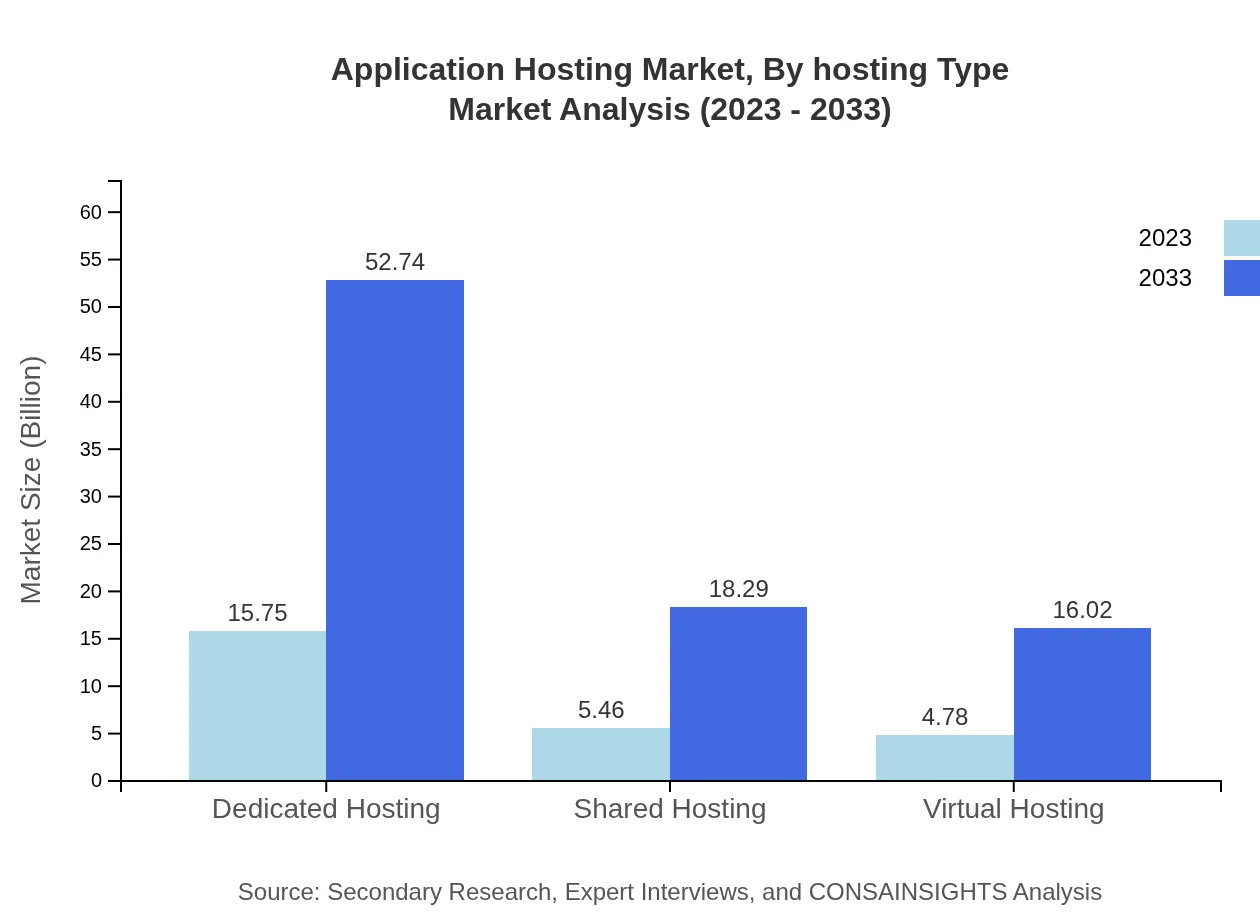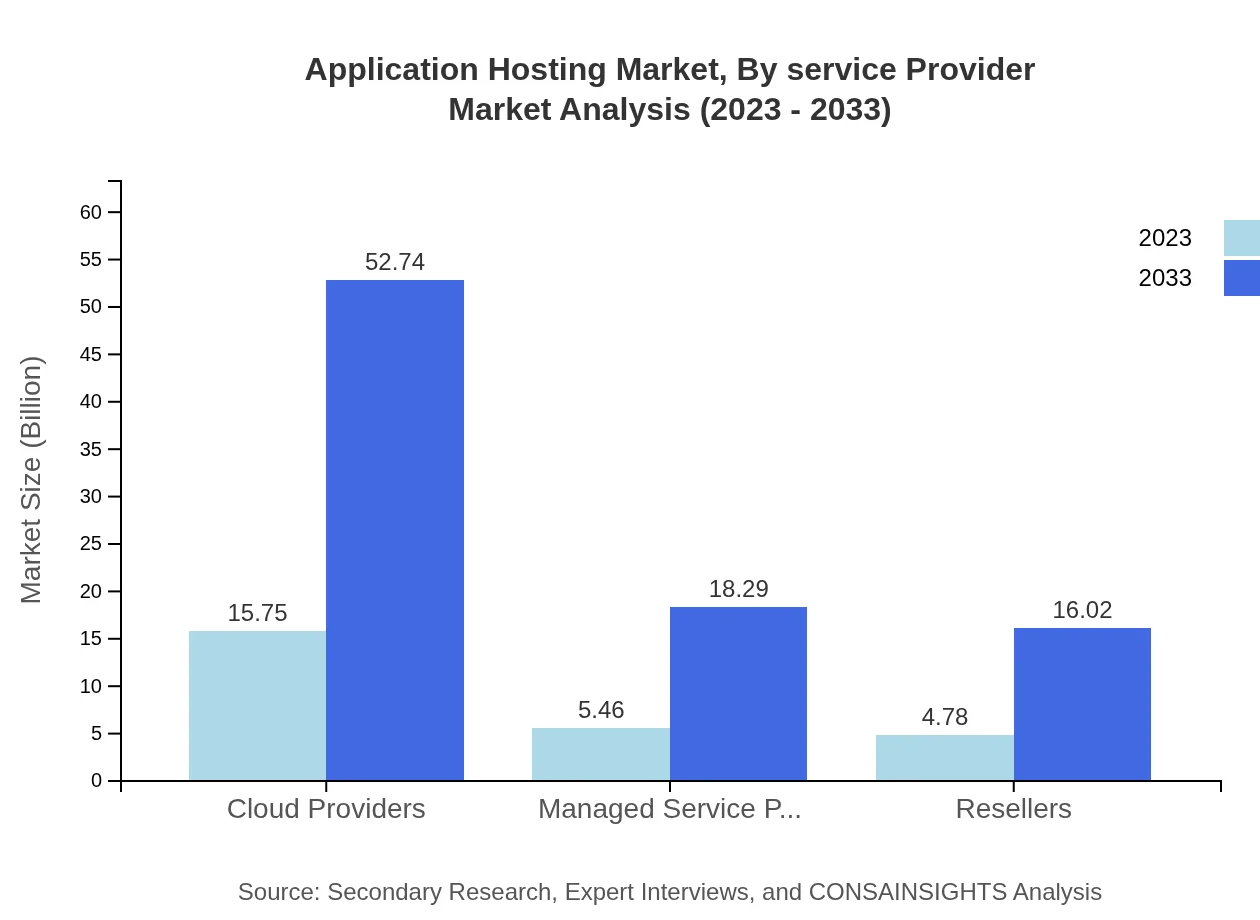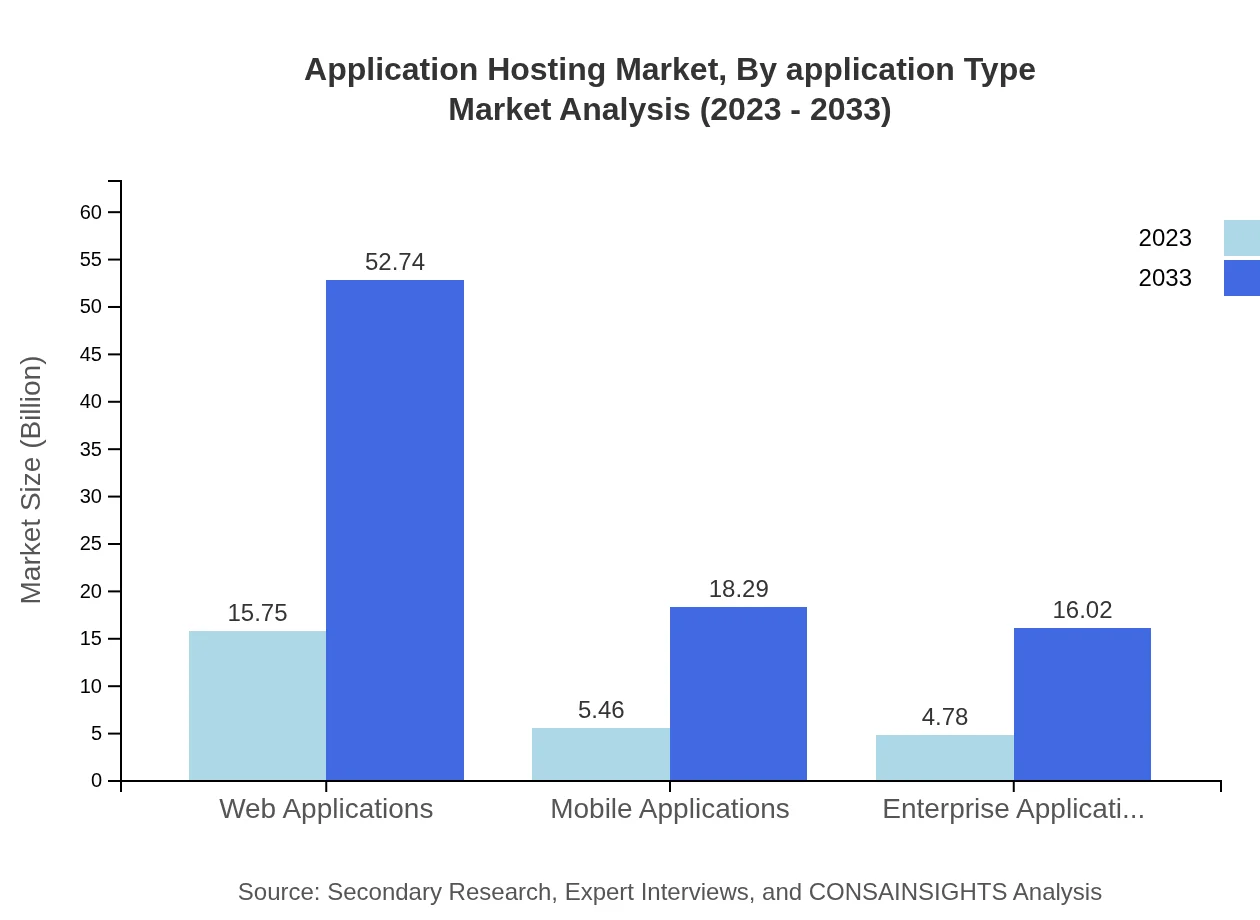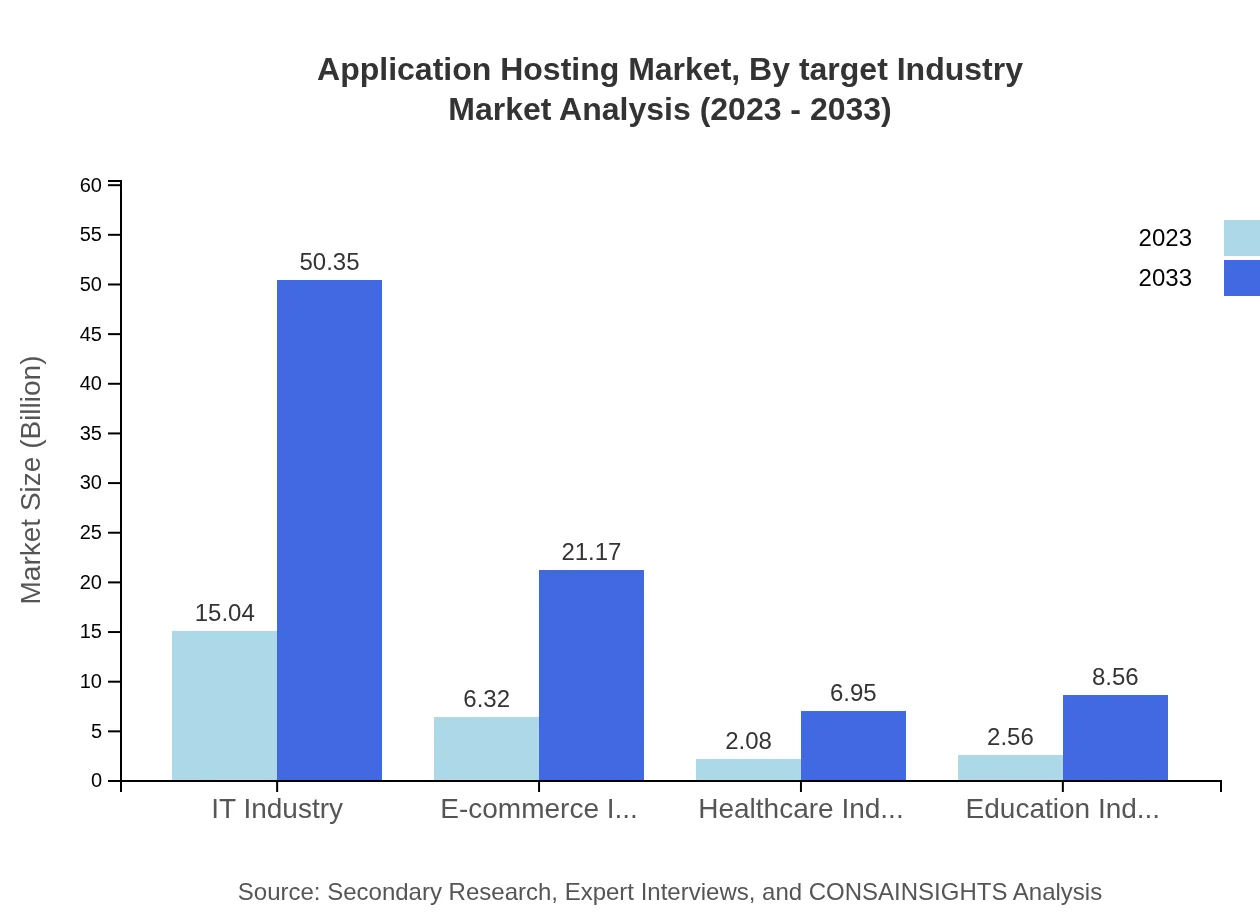Application Hosting Market Report
Published Date: 31 January 2026 | Report Code: application-hosting
Application Hosting Market Size, Share, Industry Trends and Forecast to 2033
This market report delves into the Application Hosting sector, analyzing its current landscape, opportunities for growth, and forecasts from 2023 to 2033. It offers insights on market size, industry trends, segmentation, and leaders in the field.
| Metric | Value |
|---|---|
| Study Period | 2023 - 2033 |
| 2023 Market Size | $26.00 Billion |
| CAGR (2023-2033) | 12.3% |
| 2033 Market Size | $87.04 Billion |
| Top Companies | Amazon Web Services (AWS), Microsoft Azure, Google Cloud Platform, IBM Cloud, DigitalOcean |
| Last Modified Date | 31 January 2026 |
Application Hosting Market Overview
Customize Application Hosting Market Report market research report
- ✔ Get in-depth analysis of Application Hosting market size, growth, and forecasts.
- ✔ Understand Application Hosting's regional dynamics and industry-specific trends.
- ✔ Identify potential applications, end-user demand, and growth segments in Application Hosting
What is the Market Size & CAGR of Application Hosting market in 2023?
Application Hosting Industry Analysis
Application Hosting Market Segmentation and Scope
Tell us your focus area and get a customized research report.
Application Hosting Market Analysis Report by Region
Europe Application Hosting Market Report:
Europe's Application Hosting market is expected to expand from $6.39 billion in 2023 to $21.38 billion by 2033. Regulatory compliance and data protection laws are pushing organizations to seek secure hosting environments, thus fueling market demand.Asia Pacific Application Hosting Market Report:
In 2023, the Application Hosting market in the Asia Pacific region is estimated to be valued at $5.01 billion, with expectations to reach $16.78 billion by 2033. The market is driven by increasing internet penetration, need for cloud services, and favorable government initiatives supporting digital transformation.North America Application Hosting Market Report:
North America holds a significant portion of the market, projected to grow from $9.53 billion in 2023 to $31.90 billion by 2033. The region's growth is propelled by a robust technology ecosystem, high demand for scalable application services, and the presence of key industry players.South America Application Hosting Market Report:
The South American market is set to grow from $2.59 billion in 2023 to $8.66 billion by 2033. The rising adoption of cloud technologies and a growing startup ecosystem are key growth drivers in this region, alongside improving telecommunications infrastructure.Middle East & Africa Application Hosting Market Report:
The market in the Middle East and Africa is set to grow from $2.49 billion in 2023 to $8.32 billion by 2033. Increasing digitalization efforts, alongside government initiatives to enhance technology infrastructure, are significant contributors to market growth.Tell us your focus area and get a customized research report.
Application Hosting Market Analysis By Hosting Type
The Application Hosting market by hosting type is dominated by dedicated hosting, projected to grow from $15.75 billion in 2023 to $52.74 billion by 2033, holding 60.59% market share. Shared hosting, meanwhile, will increase from $5.46 billion in 2023 to $18.29 billion by 2033, capturing 21.01% market share. Virtual hosting is expected to rise from $4.78 billion to $16.02 billion, accounting for 18.4% market share during the same period.
Application Hosting Market Analysis By Service Provider
In the market segment defined by service provider types, cloud providers dominate, with projections indicating growth from $15.75 billion in 2023 to $52.74 billion by 2033, also capturing 60.59% market share. Managed service providers are expected to experience growth from $5.46 billion to $18.29 billion, accounting for 21.01% of the market share. Resellers, though smaller, will also see growth from $4.78 billion to $16.02 billion during the same timeframe.
Application Hosting Market Analysis By Application Type
The market by application type displays web applications pacing the growth, moving from $15.75 billion in 2023 to $52.74 billion in 2033 and maintaining 60.59% share. Mobile applications will grow from $5.46 billion to $18.29 billion, holding a 21.01% share, while enterprise applications are projected to grow from $4.78 billion to $16.02 billion with an 18.4% share.
Application Hosting Market Analysis By Target Industry
The by-target-industry segment sees the IT industry leading from $15.04 billion to $50.35 billion (57.85% share). The e-commerce sector follows closely, expected to rise from $6.32 billion to $21.17 billion (24.32% share). Meanwhile, healthcare and education industries represent smaller but significant segments, with healthcare growing from $2.08 billion to $6.95 billion (7.99% share) and education from $2.56 billion to $8.56 billion (9.84% share).
Application Hosting Market Trends and Future Forecast
Tell us your focus area and get a customized research report.
Global Market Leaders and Top Companies in Application Hosting Industry
Amazon Web Services (AWS):
AWS is a leading cloud service provider offering a range of hosting solutions including cloud computing, storage, and application hosting. Its robust infrastructure and broad service portfolio make it a preferred choice for many enterprises.Microsoft Azure:
Microsoft Azure is known for its scalability and integration with Microsoft services, providing comprehensive hosting environments for applications and enabling seamless global operations.Google Cloud Platform:
Google Cloud provides infrastructure and growth-oriented application hosting solutions, leveraging advanced analytics and machine learning capabilities to enhance service delivery.IBM Cloud:
IBM Cloud focuses on hybrid cloud solutions, offering unique hosting services that align with enterprise demands for security and compliance.DigitalOcean:
DigitalOcean aims to simplify cloud services for developers, providing straightforward and effective application hosting options tailored to startups and small businesses.We're grateful to work with incredible clients.









FAQs
What is the market size of application Hosting?
The global application hosting market is expected to reach $26 billion by 2033, growing at a CAGR of 12.3%. This significant growth reflects increasing demand for scalable hosting solutions across various industries.
What are the key market players or companies in this application Hosting industry?
Key players in the application hosting industry include prominent cloud providers and managed service providers that dominate market share, alongside numerous regional players catering to specific customer needs.
What are the primary factors driving the growth in the application hosting industry?
The growth in the application hosting industry is fueled by the rise in cloud computing adoption, increased traffic from mobile users, and the necessity for businesses to enhance operational efficiency and scalability.
Which region is the fastest Growing in the application hosting?
Asia Pacific emerges as the fastest-growing region in the application hosting market, projected to grow from $5.01 billion in 2023 to $16.78 billion by 2033, due to rising digital transformation initiatives.
Does Consainsights provide customized market report data for the application hosting industry?
Yes, Consainsights offers customized market report data tailored to the specific needs of clients in the application hosting industry, including insights on emerging trends and competitive analysis.
What deliverables can I expect from this application hosting market research project?
Expect comprehensive deliverables which include detailed market size analysis, growth forecasts, competitive benchmarks, and actionable insights specific to application hosting segments.
What are the market trends of application hosting?
Emerging trends in application hosting include increasing reliance on cloud solutions, hybrid hosting models, and a surge in demand for flexible, user-friendly interface applications among diverse sectors.

